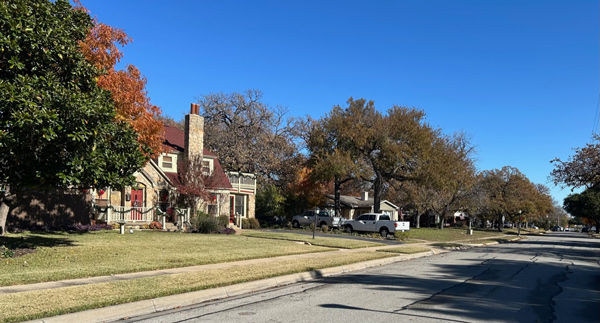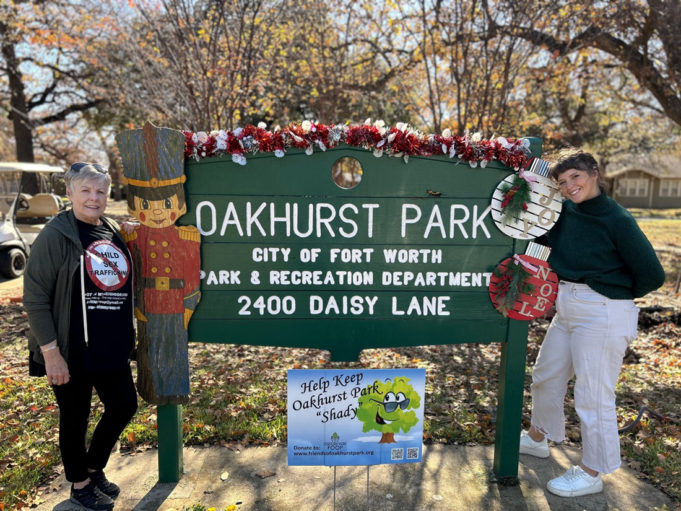The mood changed quickly. At one moment, Oakhurst residents were cheerfully laying commemorative bricks at the local park. Then when asked about the neighborhood church, Mercy Culture, the Oakhursters here grew sullen.
It’s not that they don’t like the church or its parishioners in general. It’s that Fort Worth City Council recently paved the way for Mercy Culture to construct a shelter for sex trafficking victims next to the church building, near North I-35W and Oakhurst Scenic Drive.
Increased traffic in the quiet, old neighborhood is perhaps the smallest problem attendant to Mercy Culture’s Justice Residences.
“Fort Worth needs housing for sex-trafficked victims, no doubt,” said longtime Oakhurst resident and anti-child sex trafficking community group member Sharon Kutilek Buse. “We need it badly, but it has to be done under the proper guidelines and with the proper protocols and following industry standards with best practices in place.”
Fellow Oakhurster Cole Payne confirmed that her beloved neighborhood has been grieving since the December 10 council meeting.
Despite objections from neighbors, Fort Worth City Council sided with Mercy Culture’s plan to build a long-term home for up to 100 survivors of human trafficking. Founder of the anti-human trafficking nonprofit Justice Reform, Mercy Culture co-pastor and “lead reformer” Heather Schott claims that though human trafficking is a huge issue, there aren’t many locations for survivors to seek refuge, hence the need for the residences.
Buse doesn’t disagree that human trafficking is an issue that needs attention. Afterall, she founded Not in My Neighborhood Group, a nonprofit that raises awareness about child sex trafficking prevention through meetings with experts in law enforcement, mental health, and child advocacy. Yet Buse opposed the development because she claims the project goes against best practices about addressing human trafficking.
Specifically, she takes issue with several factors: that the location of the Justice Residences is public, that there would be space for 100 survivors, and that the facility is close to a major thoroughfare, I-35, which could provide “easy access to traffickers.” She pointed out a Texas law passed in 2019 that states, “Information that relates to the location or physical layout of a family violence shelter center or victims of trafficking shelter center is confidential.” This information can be redacted by a governing body.
Buse also feels that it is best to keep human trafficking shelters limited to a smaller number of people, but it wasn’t clear if that standard has widespread acceptance. A study from the mid-2000s by the U.S. Agency for International Development says that shelters can be small or large enough for more than 100-200 survivors depending on the circumstances, but that logic may have changed over the years.
Buse described human traffickers as difficult to identify and said they think of their victims as their property. Because of this, she worried about traffickers coming to Oakhurst to reclaim their “property,” the victims.
“I can guarantee you, if you construct a 100-bed facility, traffickers will be coming to this area hoping for a glimpse or a chance at retrieving their property,” Buse said.
We earlier reached out to Mercy Culture Church with questions about the Justice Residences but never received a response.
Buse and Payne made it clear that they don’t have grievances with Mercy Culture parishioners, whom they describe as kind and hardworking. Payne moved to Oakhurst around the same time Mercy Culture did and thought that having a church in the area could only be beneficial to her and her family. However, saying opposition to the Justice Residences is “demonic,” something that Mercy Culture co-pastor and Heather’s husband, Landon Schott, said in a sermon last year, has made her think differently.
“That made me feel scared for my family’s safety,” Payne said about Landon’s remark. “I wouldn’t say that it affected how I feel about any church member of Mercy Culture, because I know they’re kind even after that statement. They’re a part of our neighborhood, too, and they’re still kind people. An organization that would say something that could put people in danger in that way made me very uncomfortable. It did change my perspective overall of what it meant to have a church at the bottom of the hill.”

Photo by Madelyn Edwards.
Still, Payne said her grievances aren’t solely with Mercy Culture Church but with Fort Worth City Council.
“My issue is with the elected officials who are elected to protect and serve the people of this city, who failed us and failed my children and my neighborhood safety,” she said. “I envision a future for Oakhurst where Oakhurst and Mercury Culture really come together and they work seamlessly together, but I envision a future for us where the representatives of my city care more about their citizens than potential legal retribution.”
Mayor Mattie Parker directly referenced the threat of a lawsuit from Mercy Culture during the council meeting. Ultimately, she said, the law is on the side of the church and that denying the amendment would likely result in litigation that would be very costly for taxpayers.
“Government at any level has no place telling any religious institution how they are permitted to live out their beliefs, especially on their own property they own,” Parker said.
The discussion at the council meeting went on for more than two and a half hours and ended with the councilmembers voting in a 6-4 decision to approve the site plan amendment. Those in favor of Mercy Culture Church’s proposal include Mayor Parker and councilmembers Gyna Bivens, Alan Blaylock, Michael Crain, Macy Hill, and Charles Lauersdorf.
Oakhurst’s councilmember, Jeanette Martinez, called the residents’ worries “valid” and motioned to deny the amendment with prejudice, which legally means that the applicant could not file the same claim again. Martinez clarified during the meeting that she has met with both parties in this case, though the lawyer representing the Schotts previously claimed to have her support.
Payne applauded councilmembers Martinez and Chris Nettles for opposing the site plan amendment. For Nettles’ part, he called out the political threats and bullying tactics involved in this case and claimed that the council doesn’t “give a damn about the community” during the meeting.
Despite the support, Payne felt that her neighborhood and their concerns were disregarded.
“If safety was a top priority, the vote wouldn’t have gone the way it did,” she said. “Tanglewood, Monticello — do you think that those councilmembers would allow this to happen in those neighborhoods? Do you think those neighborhoods would say, ‘Let’s do it, let’s build it’? I don’t want this to be true, but I feel like certain citizens have more representation from our elected officials than others, and, in my opinion, my life for the next year will be dedicated to people who care about their community getting into a city office.”
Buse wasn’t surprised by the vote. She also praised Martinez and said the rest of the council should have followed her lead.
“The facility does not affect the other council members’ districts,” Buse said. “This does not affect their constituents, and the other councilmembers should have supported the residents of Oakhurst and voted with Councilwoman Martinez. This is a citywide issue. This is a safety issue. Next time, it could be in their area affecting their neighborhoods.”
The statement that Oakhurst Neighborhood Association released on Facebook following council’s decision says that they are “exploring all available options up to and including legal action.”
Buse said continuing to fight isn’t the answer for her, and instead she’d like to work with Mercy Culture Church to ensure the best outcome for Oakhurst and survivors of human trafficking.
Payne said her approach to the future differs from Buse’s because she has a family with small children.
“I don’t know that my future will be able to stay here,” she said. “I have to think about that, and I have to look at how Mercy Culture approaches this.”
Payne added that she will still support Oakhurst no matter what happens next.












